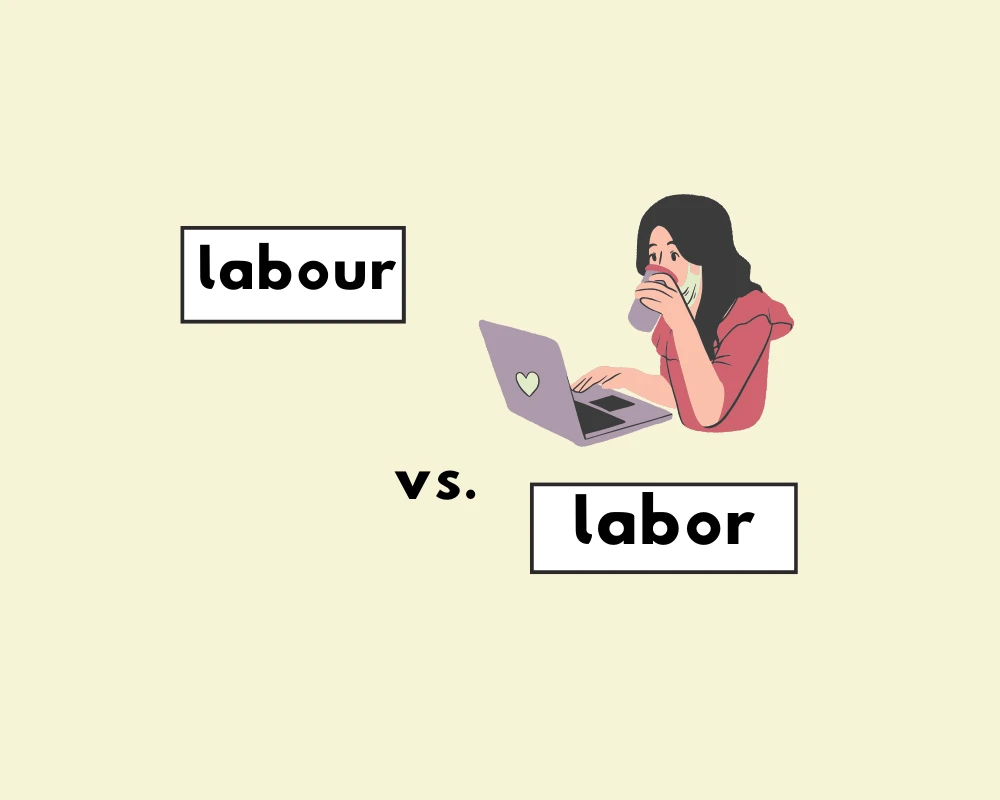Labor and labour are actually both correct spellings to refer to the noun that means, “work”, (typically arduous physical work).
Which is correct: labor or labour?
Labor and labour are both recognized spellings; the difference is where they’re used:
The report detailed the laborious process of harvesting the crop. .
British workers demanded better working conditions and higher labour costs. .
The team labored tirelessly, but the project remained unfinished. .
He was laboring on his thesis for many years, and finally finished. .
- UK English spells “labour” with the “u”.
- US English spells “labor” without the “u”.
Other “-our”/”-or” words
Other words that share the “-our” / “-or” suffix follow the same spelling convention:
| UK English | US English |
| favour | favor |
| labour | labor |
| behaviour | behavior |
| colour | color |
| neighbour | neighbor |
| endeavour | endeavor |
Verb forms of labour/labor
Other verb/noun forms of labour/labor follow the same spelling pattern:
| US English | labor, labored, laboring, labors. |
|---|---|
| UK English | labour, laboured, labouring, labours. |
Sentences using labour as a noun
| Word Form | Examples |
|---|---|
| Other | The price will include the labour/labor and materials.
The company wants to keep down labour/labor costs. The workers voted to withdraw their labour/labor. Companies are making huge profits by exploiting cheap labour/labor in poor countries. |
Sentences using labour as a verb
| Word Form | Examples |
|---|---|
| Other | He was in his study labouring/laboring away over some old papers.
They laboured/labored for years to clear their son’s name. With the engine labouring/laboring, the car struggled up the hill. The horses laboured/labored up the steep slope. |
“labor” (US) and “labour” (UK), associate the “u” in “labour” with “UK.”.
Synonyms of labour
- work
- employment
- exertion
- hard work
- toil
- industry
- effort
- grind away
- endeavour
Phrases with the word labour (or labor)
| Phrase | Meaning |
|---|---|
| Labor Day | A federal holiday in the US celebrated on the first Monday of every September to honour and recognize the American Labor Movement. |
| a labor of love | Work done from love or passion rather than money or some other motivation. |
| green labour | A phrase to describe people that are new in the workplace and “fresh” (or uninfluenced by previous work experience). |
| to labour away at something | To work diligently or tirelessly at something. |
| to induce labour (to give birth) | To cause a pregnant woman to begin the birthing process. |
| to labour the point | To talk about or emphasize something excessively or repetitively, |
| to labour under the illusion or delusion of something | To operate or live under a belief or conviction of some kind. |
| the fruit of one’s labour | Meaning the outcome or result of one’s efforts or hard work. |
The origin of labour
From Etymonline:
|
c. 1300, “a task, a project” (such as the labors of Hercules); later “exertion of the body; trouble, difficulty, hardship” (late 14c.), from Old French labor “toil, work, exertion, task; tribulation, suffering” (12c., Modern French labeur), from Latin labor “toil, exertion; hardship, pain, fatigue; a work, a product of labor,” a word of uncertain origin. |
Learn more about US English vs. UK English
- Which is it: “Favorite” or “Favourite”?
- Is it Spelled Metre or Meter?
- Which is Correct: Honour or Honor?
- Is it “Behaviour” or “Behavior”?
- Color or Colour (Which is Correct?)
- Favour or Favor (Which is Correct?)
Worksheet
According to the blog post, what primarily determines whether to use “labor” or “labour”?
In UK English, the preferred spelling for the noun meaning “work” is:
In US English, the preferred spelling for the noun meaning “work” is:
Which spelling is correct for the past tense form of the verb in a US English sentence?
Which spelling is correct for the present participle form of the verb in a UK English sentence?
The company wants to keep down costs (UK English).
Americans celebrate Day on the first Monday in September.
They for years to clear their son’s name (UK English).
He was on his thesis for many years (US English).
The of the sky was blue (US English).
FAQs
Is labor or labour correct?
+
How to spell verb forms of labor/labour?
+
Do other -or/-our words follow rule?
+
What’s a common labor/labour mistake?
+
How remember labor/labour spelling?
+
- Harper, Douglas. “Etymology of labor.” Online Etymology Dictionary, Accessed 19 January, 2024.
- Wikipedia contributors. “Labor Day.” Wikipedia, The Free Encyclopedia. Wikipedia, The Free Encyclopedia, 2 Dec. 2023. Web. 21 Jan. 2024.
Yash, D. "Is the Right Word Labour or Labor?." Grammarflex, Aug 30, 2025, https://grammarflex.com/is-it-labour-or-labor/.








